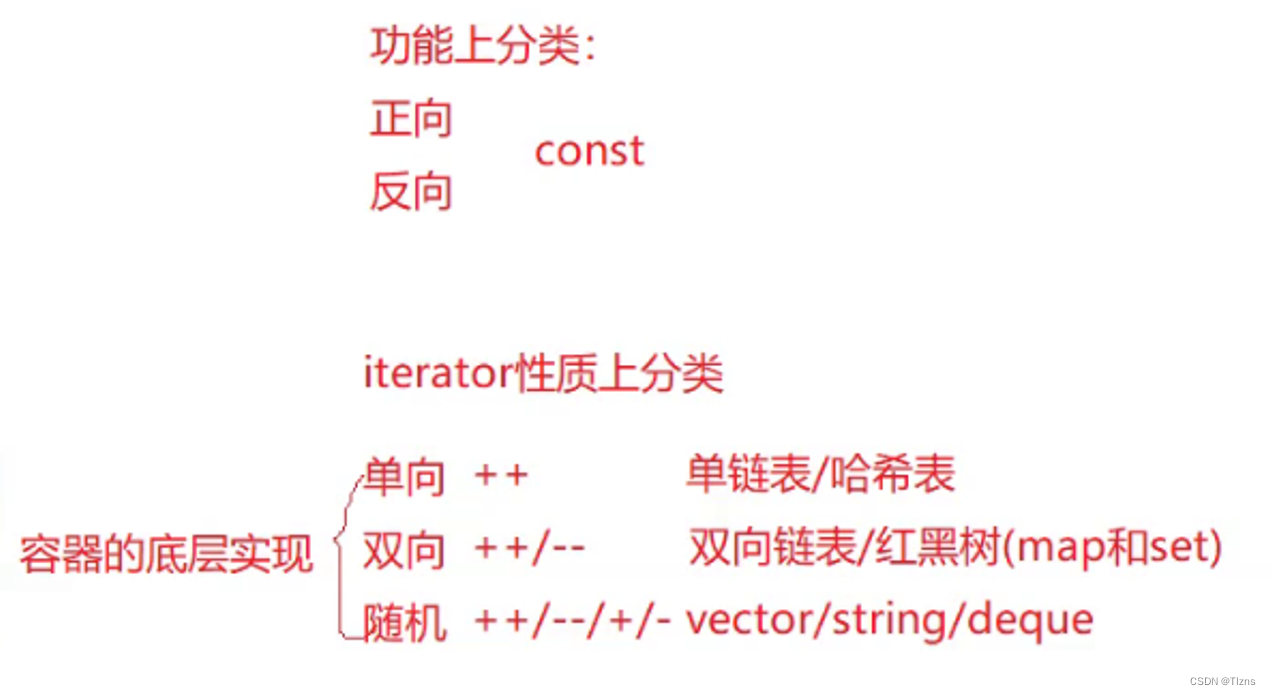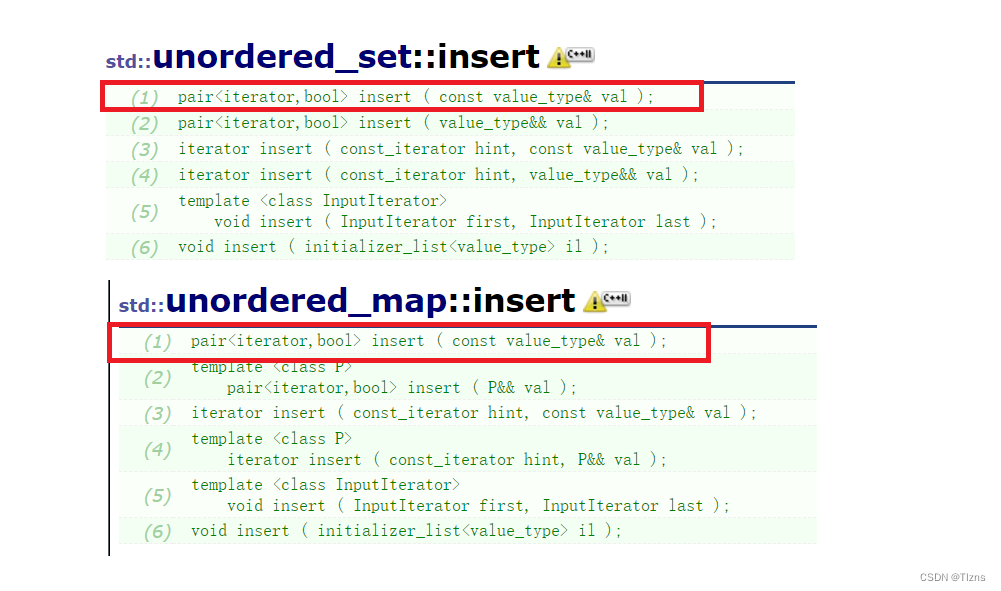unordered_map与unordered_set的实现
文章目录
前言
在C++11中新增了两个很好用的容器,分别是unordered_map与unordered_set,和map和set有不同之处
map与set的底层实现是平衡树——红黑树,并且采取中序遍历时默认有序
而本文的unordered_map与unordered_set底层实现是哈希思想(拉链法),并且他的存储方式不支持排序,所以是unordered
两者的查找效率综合比较,会发现unordered_map与unordered_set的效率综合会更高,所以在C++11中支持了unordered_map与unordered_set
本文中是用哈希桶的拉链法来封装unordered_map与unordered_set
这里的封装与红黑树封装map和set的封装相似,但此处会更难
具体通过解决问题来实现
- HashTable的迭代器实现
- 封装时HashTable如何取出map的key和set的key
- 取出key后如何针对不同类型key建立映射关系
- 如何解决Set中key不能被修改,Map中key不能被修改,value能被修改的问题
- Insert插入返回值问题以及Map[]的重载实现
关于哈希思想及其具体实现细节看我的上篇文章:数据结构之哈希表
STL迭代器特点

一、问题一
这里就一步步,先实现iterator再实现const_iterator版本了,而是直接放出能适配iterator与const_iterator的版本,本质上就是用类模板泛型编程,需要什么就调用什么,是什么类型就返回什么类型的迭代器
这里尤为注意的一点是,这里的迭代器是单向迭代器,只支持++,而由于底层是哈希表的拉链法实现的,是数组与链表结合的方式
在实现运算符重载++时,本质上就是在逐个遍历哈希桶,而当前桶走完的时候,需要进入下一个桶,那么如何判断当前桶的位置,以及如何找到下一个桶,就需要把这个数组或者整个哈希表传过来,这里我们做的是把整个哈希表传过来
注意:其实将数组传过来会更简单些,传哈希表会有一些问题
- 我们将哈希表传过来,是可能要访问哈希表内的私有变量来获得下一个桶,而直接在_HTIterator这个类内使用哈希表内的私有变量是不可取的,所以需要在哈希表内声明友元
- 此处还涉及编译问题,由于编译器是从上往下编译代码,我们将迭代器写在哈希表代码的上面,而迭代器中有哈希表,这里编译器并不认识哈希表,因为哈希表的定义还未出现,所以还需要哈希表对应的类的声明
template<class K, class T, class Ref, class Ptr, class KeyOfT, class Hash>
friend struct _HTIterator;
template<class K, class T, class KeyOfT, class Hash>
class HashTable;
至于class KeyOfT 与 class Hash这两个类模板的作用,则在下文中解答
HashTable.h
namespace hash_bucket
{
template<class T>
struct HashNode
{
HashNode(const T& data)
:_data(data)
,_next(nullptr)
{}
T _data;
HashNode* _next;
};
template<class K, class T, class KeyOfT, class Hash>
class HashTable;
template<class K, class T, class Ref, class Ptr, class KeyOfT, class Hash>
struct _HTIterator
{
typedef HashNode<T> Node;
typedef _HTIterator<K, T, Ref, Ptr, KeyOfT, Hash> Self;
typedef _HTIterator<K, T, T&, T*, KeyOfT, Hash> iterator;
_HTIterator(Node* node, HashTable<K, T, KeyOfT, Hash>* pht)
:_node(node)
,_pht(pht)
{}
_HTIterator(Node* node, const HashTable<K, T, KeyOfT, Hash>* pht)
:_node(node)
, _pht(pht)
{}
_HTIterator(const iterator& x)
:_node(x._node)
, _pht(x._pht)
{}
Ref operator*()
{
return _node->_data;
}
Ptr operator->()
{
return &_node->_data;
}
Self operator++()
{
Hash hf;
KeyOfT kot;
size_t hashi = hf(kot(_node->_data)) % _pht->_t.size();
if (_node->_next != nullptr)
{
_node = _node->_next;
}
else
{
hashi++;
while (hashi < _pht->_t.size())
{
if (_pht->_t[hashi])
{
_node = _pht->_t[hashi];
break;
}
hashi++;
}
}
if (hashi == _pht->_t.size())
{
_node = nullptr;
}
return *this;
}
bool operator==(const Self& it)
{
return _node == it._node;
}
bool operator!=(const Self& it)
{
return _node != it._node;
}
const HashTable<K, T, KeyOfT, Hash>* _pht;
Node* _node;
};
template<class K, class T, class KeyOfT, class Hash>
class HashTable
{
typedef HashNode<T> Node;
template<class K, class T, class Ref, class Ptr, class KeyOfT, class Hash>
friend struct _HTIterator;
public:
HashTable(size_t n = 10)
{
_t.resize(n);
}
typedef _HTIterator<K, T, T&, T*, KeyOfT, Hash> iterator;
typedef _HTIterator<K, T, const T&, const T*, KeyOfT, Hash> const_iterator;
iterator begin()
{
size_t hashi = 0;
while (hashi < _t.size())
{
if (_t[hashi])
{
break;
}
hashi++;
}
if (hashi == _t.size())
{
return iterator(nullptr, this);
}
return iterator(_t[hashi], this);
}
iterator end()
{
return iterator(nullptr, this);
}
const_iterator begin()const
{
size_t hashi = 0;
while (hashi < _t.size())
{
if (_t[hashi])
{
break;
}
hashi++;
}
if (hashi == _t.size())
{
return iterator(nullptr, this);
}
return iterator(_t[hashi], this);
}
const_iterator end()const
{
return iterator(nullptr, this);
}
pair<iterator,bool> Insert(const T& data)
{
KeyOfT kot;
Hash hf;
iterator ret = Find(kot(data));
if (ret != end())
{
return make_pair(ret, false);
}
//扩容
if (_n / _t.size() == 1)
{
size_t newsize = _t.size() * 2;
HashTable newtable(newsize);
for (int i = 0; i < _n; i++)
{
Node* cur = _t[i];
while (cur)
{
Node* next = cur->_next;
size_t hashi = hf(kot(cur->_data)) % newsize;
cur->_next = newtable._t[hashi];
newtable._t[hashi] = cur;
cur = next;
}
_t[i] = nullptr;
}
swap(_t, newtable._t);
}
size_t hashi = hf(kot(data)) % _t.size();
Node* newnode = new Node(data);
newnode->_next = _t[hashi];
_t[hashi] = newnode;
_n++;
return make_pair(iterator(newnode, this), true);
}
iterator Find(const K& key)
{
Hash hf;
KeyOfT kot;
size_t hashi = hf(key) % _t.size();
Node* cur = _t[hashi];
while (cur)
{
if (kot(cur->_data) == key)
{
return iterator(cur, this);
}
cur = cur->_next;
}
return iterator(nullptr, this);
}
bool Erase(const K& key)
{
Hash hf;
KeyOfT kot;
size_t hashi = hf(key) % _t.size();
Node* cur = _t[hashi];
Node* prev = nullptr;
if (kot(cur->_data) == key)
{
_t[hashi] = cur->_next;
delete cur;
return true;
}
while (cur)
{
if (kot(cur->_data) == key)
{
prev->_next = cur->_next;
delete cur;
_n--;
return true;
}
prev = cur;
cur = cur->_next;
}
return false;
}
private:
vector<HashNode<T>*> _t;
size_t _n = 0;
};
}
二、问题二&问题三
1.封装时如何取出key
首先解释一下问题,我们的目的是将unordered_map与unordered_set用哈希表封装实现,map中存的是pair,set中存的是key,而如何用一份哈希表适配两种结构呢
在封装的时候解决这个问题,在unordered_map与unordered_set中写一个内部类,这个类之中实现了一个仿函数,用来返回key,并且将其传给哈希表内
template<class K, class V, class Hash = HashFunc<K>>
class unordered_map
{
public:
struct KeyOfT
{
const K& operator()(const pair<K, V>& kv)
{
return kv.first;
}
};
private:
hash_bucket::HashTable<K, pair<const K, V>, KeyOfT, Hash> _ht;
};
template<class K, class Hash = HashFunc<K>>
class unordered_set
{
public:
struct KeyOfT
{
const K& operator()(const K& key)
{
return key;
}
};
private:
hash_bucket::HashTable<K, K, KeyOfT, Hash> _ht;
};
2.不同类型key如何建立对应关系
本文的拉链法中,使用的哈希函数是除留余数法,如果key是int类型的话那正好,可以直接用key除,但如果key是string或者自定义类型,那么就不能够直接除了,则需要将其转换成int类型,另外一个模板参数Hash,则是将其转换方式传给哈希表
如果是内置类型的float,double之类的,我们可以直接强转成size_t返回
如果是string类型,由于string比较常用,我们可以为string搞个特化,默认支持string
上面两个都是默认支持的,用默认缺省值就行,不需要手动传Hash
而如果是自定义类型,则需要使用者通过接口手动传Hash,因为默认的缺省值用不了
template<class K>
struct HashFunc
{
size_t operator()(const K& key)
{
return (size_t)key;
}
};
template<>
struct HashFunc<string>
{
size_t operator()(const string& key)
{
size_t hash = 0;
for (auto e : key)
{
hash *= 13;
hash += e;
}
return hash;
}
};
三、问题四&问题五
问题四与问题五与set与map用红黑树封装的问题相同
问题四
set的iterator和const_iterator都是红黑树的const_iterator复用而来
map中的iterator是红黑树的iterator复用而来,const_iterator是红黑树的const_iterator复用而来
既然set中的迭代器都是const_iterator所以key自然不能被修改
typedef typename hash_bucket::HashTable<K, K, KeyOfT, Hash>::const_iterator iterator;
typedef typename hash_bucket::HashTable<K, K, KeyOfT, Hash>::const_iterator const_iterator;
map解决key不能被修改,value能被修改的原理也很简单,就是在实例化的时候,声明第二个模板参数——在map中也就是pair,pair的first是const类型
private:
hash_bucket::HashTable<K, pair<const K, V>, KeyOfT, Hash> _ht;
问题五
unordered_map与unordered_set与map和set的红黑树封装相同,insert的返回值都是一个键值对

first是一个迭代器,second是一个bool类型
基于此性质,引出了map的计数功能,可以通过insert返回的迭代器查看是否有key值,如果不存在则插入,将value值赋值为1,如果key已经存在,则通过insert返回的迭代器将value++,以此实现计数功能,所以map实现了operator[],用来计数
V& operator[](const K& key)
{
return _ht.Insert(make_pair(key, V())).first->second;
}
四、实现代码
MyUnorderedSet.h
#include "HashTable.h"
namespace Tlzns
{
template<class K, class Hash = HashFunc<K>>
class unordered_set
{
public:
struct KeyOfT
{
const K& operator()(const K& key)
{
return key;
}
};
typedef typename hash_bucket::HashTable<K, K, KeyOfT, Hash>::const_iterator iterator;
typedef typename hash_bucket::HashTable<K, K, KeyOfT, Hash>::const_iterator const_iterator;
iterator begin()const
{
return _ht.begin();
}
iterator end()const
{
return _ht.end();
}
pair<iterator, bool> Insert(const K& key)
{
auto ret = _ht.Insert(key);
return pair<iterator, bool>(iterator(ret.first._node, ret.first._pht), ret.second);
}
bool Erase(const K& key)
{
return _ht.Erase(key);
}
iterator Find(const K& key)
{
return _ht.Find(key);
}
private:
hash_bucket::HashTable<K, K, KeyOfT, Hash> _ht;
};
void test_set()
{
unordered_set<int> us;
us.Insert(5);
us.Insert(15);
us.Insert(52);
us.Insert(3);
unordered_set<int>::iterator it = us.begin();
while (it != us.end())
{
//*it += 5;
cout << *it << " ";
++it;
}
cout << endl;
for (auto e : us)
{
cout << e << " ";
}
cout << endl;
}
}
MyUnorderedMap.h
#include "HashTable.h"
namespace Tlzns
{
template<class K, class V, class Hash = HashFunc<K>>
class unordered_map
{
public:
struct KeyOfT
{
const K& operator()(const pair<K, V>& kv)
{
return kv.first;
}
};
typedef typename hash_bucket::HashTable<K, pair<const K, V>, KeyOfT, Hash>::iterator iterator;
typedef typename hash_bucket::HashTable<K, pair<const K, V>, KeyOfT, Hash>::const_iterator const_iterator;
iterator begin()
{
return _ht.begin();
}
iterator end()
{
return _ht.end();
}
const_iterator begin()const
{
return _ht.begin();
}
const_iterator end()const
{
return _ht.end();
}
pair<iterator, bool> Insert(const pair<K, V>& kv)
{
return _ht.Insert(kv);
}
bool Erase(const K& key)
{
return _ht.Erase(key);
}
iterator Find(const K& key)
{
return _ht.Find(key);
}
V& operator[](const K& key)
{
return _ht.Insert(make_pair(key, V())).first->second;
}
private:
hash_bucket::HashTable<K, pair<const K, V>, KeyOfT, Hash> _ht;
};
void test_map()
{
unordered_map<string, string> dict;
dict.Insert(make_pair("sort", ""));
dict.Insert(make_pair("string", ""));
dict.Insert(make_pair("insert", ""));
unordered_map<string, string>::const_iterator it = dict.begin();
for (auto& kv : dict)
{
//kv.first += 'x';
kv.second += 'x';
cout << kv.first << ":" << kv.second << endl;
}
cout << endl;
string arr[] = { "香蕉", "甜瓜","苹果", "西瓜", "苹果", "西瓜", "苹果", "苹果", "西瓜", "苹果", "香蕉", "苹果", "香蕉" };
unordered_map<string, int> count_map;
for (auto& e : arr)
{
count_map[e]++;
}
for (auto& kv : count_map)
{
cout << kv.first << ":" << kv.second << endl;
}
cout << endl;
}
}
HashTable.h
#include <iostream>
#include <vector>
using namespace std;
template<class K>
struct HashFunc
{
size_t operator()(const K& key)
{
return (size_t)key;
}
};
template<>
struct HashFunc<string>
{
size_t operator()(const string& key)
{
size_t hash = 0;
for (auto e : key)
{
hash *= 13;
hash += e;
}
return hash;
}
};
namespace hash_bucket
{
template<class T>
struct HashNode
{
HashNode(const T& data)
:_data(data)
,_next(nullptr)
{}
T _data;
HashNode* _next;
};
template<class K, class T, class KeyOfT, class Hash>
class HashTable;
template<class K, class T, class Ref, class Ptr, class KeyOfT, class Hash>
struct _HTIterator
{
typedef HashNode<T> Node;
typedef _HTIterator<K, T, Ref, Ptr, KeyOfT, Hash> Self;
typedef _HTIterator<K, T, T&, T*, KeyOfT, Hash> iterator;
_HTIterator(Node* node, HashTable<K, T, KeyOfT, Hash>* pht)
:_node(node)
,_pht(pht)
{}
_HTIterator(Node* node, const HashTable<K, T, KeyOfT, Hash>* pht)
:_node(node)
, _pht(pht)
{}
_HTIterator(const iterator& x)
:_node(x._node)
, _pht(x._pht)
{}
Ref operator*()
{
return _node->_data;
}
Ptr operator->()
{
return &_node->_data;
}
Self operator++()
{
Hash hf;
KeyOfT kot;
size_t hashi = hf(kot(_node->_data)) % _pht->_t.size();
if (_node->_next != nullptr)
{
_node = _node->_next;
}
else
{
hashi++;
while (hashi < _pht->_t.size())
{
if (_pht->_t[hashi])
{
_node = _pht->_t[hashi];
break;
}
hashi++;
}
}
if (hashi == _pht->_t.size())
{
_node = nullptr;
}
return *this;
}
bool operator==(const Self& it)
{
return _node == it._node;
}
bool operator!=(const Self& it)
{
return _node != it._node;
}
const HashTable<K, T, KeyOfT, Hash>* _pht;
Node* _node;
};
template<class K, class T, class KeyOfT, class Hash>
class HashTable
{
typedef HashNode<T> Node;
template<class K, class T, class Ref, class Ptr, class KeyOfT, class Hash>
friend struct _HTIterator;
public:
HashTable(size_t n = 10)
{
_t.resize(n);
}
typedef _HTIterator<K, T, T&, T*, KeyOfT, Hash> iterator;
typedef _HTIterator<K, T, const T&, const T*, KeyOfT, Hash> const_iterator;
iterator begin()
{
size_t hashi = 0;
while (hashi < _t.size())
{
if (_t[hashi])
{
break;
}
hashi++;
}
if (hashi == _t.size())
{
return iterator(nullptr, this);
}
return iterator(_t[hashi], this);
}
iterator end()
{
return iterator(nullptr, this);
}
const_iterator begin()const
{
size_t hashi = 0;
while (hashi < _t.size())
{
if (_t[hashi])
{
break;
}
hashi++;
}
if (hashi == _t.size())
{
return iterator(nullptr, this);
}
return iterator(_t[hashi], this);
}
const_iterator end()const
{
return iterator(nullptr, this);
}
pair<iterator,bool> Insert(const T& data)
{
KeyOfT kot;
Hash hf;
iterator ret = Find(kot(data));
if (ret != end())
{
return make_pair(ret, false);
}
//扩容
if (_n / _t.size() == 1)
{
size_t newsize = _t.size() * 2;
HashTable newtable(newsize);
for (int i = 0; i < _n; i++)
{
Node* cur = _t[i];
while (cur)
{
Node* next = cur->_next;
size_t hashi = hf(kot(cur->_data)) % newsize;
cur->_next = newtable._t[hashi];
newtable._t[hashi] = cur;
cur = next;
}
_t[i] = nullptr;
}
swap(_t, newtable._t);
}
size_t hashi = hf(kot(data)) % _t.size();
Node* newnode = new Node(data);
newnode->_next = _t[hashi];
_t[hashi] = newnode;
_n++;
return make_pair(iterator(newnode, this), true);
}
iterator Find(const K& key)
{
Hash hf;
KeyOfT kot;
size_t hashi = hf(key) % _t.size();
Node* cur = _t[hashi];
while (cur)
{
if (kot(cur->_data) == key)
{
return iterator(cur, this);
}
cur = cur->_next;
}
return iterator(nullptr, this);
}
bool Erase(const K& key)
{
Hash hf;
KeyOfT kot;
size_t hashi = hf(key) % _t.size();
Node* cur = _t[hashi];
Node* prev = nullptr;
if (kot(cur->_data) == key)
{
_t[hashi] = cur->_next;
delete cur;
return true;
}
while (cur)
{
if (kot(cur->_data) == key)
{
prev->_next = cur->_next;
delete cur;
_n--;
return true;
}
prev = cur;
cur = cur->_next;
}
return false;
}
private:
vector<HashNode<T>*> _t;
size_t _n = 0;
};
}






















 2156
2156











 被折叠的 条评论
为什么被折叠?
被折叠的 条评论
为什么被折叠?








